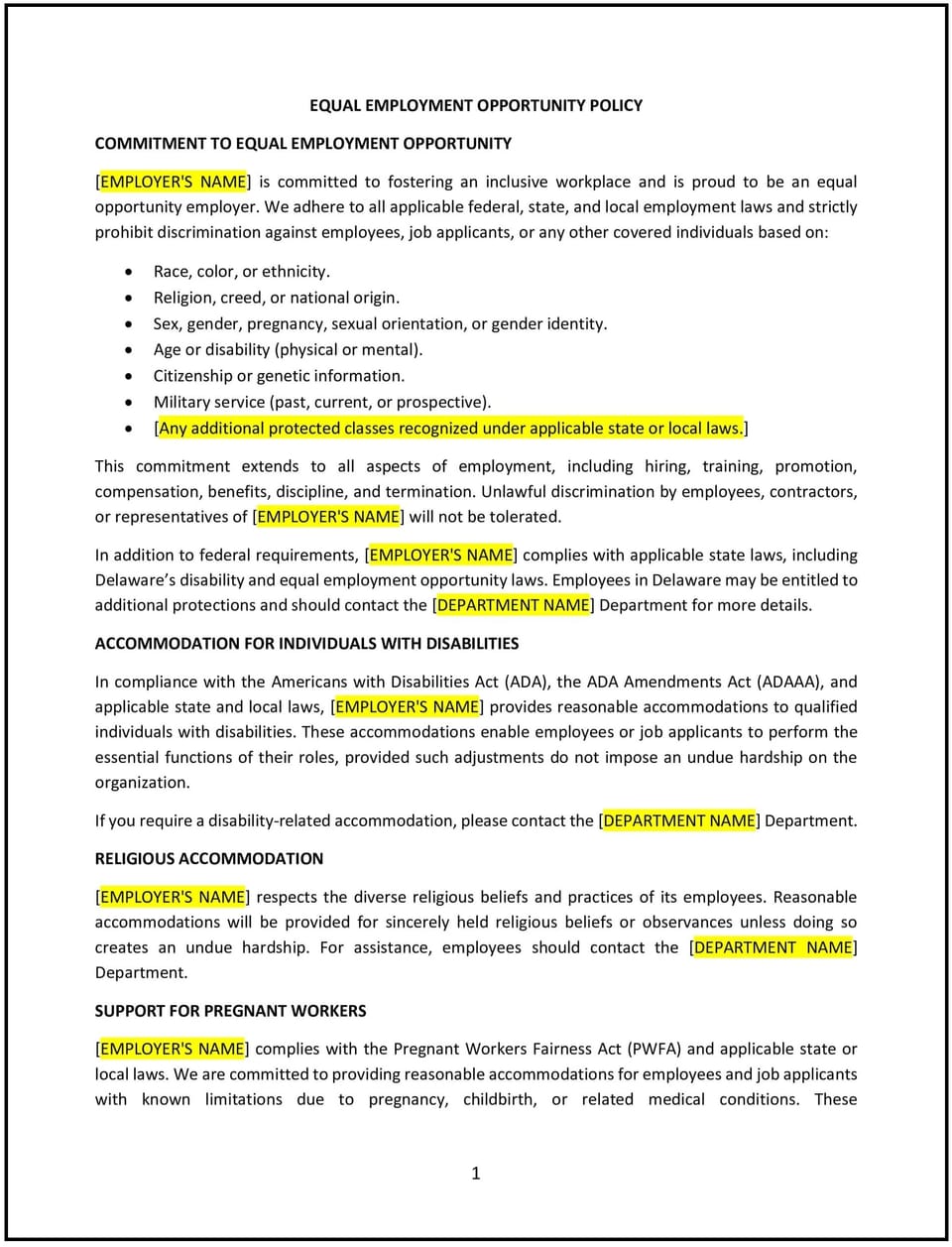Equal employment opportunity policy (Delaware): Free template

Equal employment opportunity policy (Delaware)
An equal employment opportunity (EEO) policy helps Delaware businesses promote fairness and inclusivity by ensuring all employment decisions are based on qualifications, merit, and business needs. This policy prohibits discrimination based on protected characteristics and aligns with federal and Delaware anti-discrimination laws.
By implementing this policy, businesses can foster an inclusive workplace, reduce legal risks, and attract diverse talent.
How to use this equal employment opportunity policy (Delaware)
- Define protected characteristics: Clearly state the characteristics protected under Delaware and federal laws, such as race, gender, age, disability, religion, and sexual orientation.
- Outline non-discrimination practices: Specify that all employment decisions, including hiring, promotion, compensation, and termination, will be made without discrimination.
- Provide a reporting mechanism: Include procedures for employees to report suspected violations of the policy, such as harassment or discrimination, and ensure confidentiality.
- Address anti-retaliation: Emphasize that employees will not face retaliation for reporting discrimination or participating in investigations.
- Train employees and managers: Offer regular training on anti-discrimination laws, unconscious bias, and fostering an inclusive workplace.
- Monitor compliance: Regularly review hiring and employment practices to ensure alignment with the policy and legal requirements.
Benefits of using this equal employment opportunity policy (Delaware)
This policy offers several benefits for Delaware businesses:
- Promotes inclusivity: Demonstrates the company’s commitment to diversity and equal opportunity for all employees.
- Ensures compliance: Aligns with Delaware and federal anti-discrimination laws, reducing the risk of legal disputes.
- Improves workplace culture: Fosters a respectful and inclusive environment that values diverse perspectives and contributions.
- Attracts top talent: Enhances the company’s reputation as an employer of choice for a diverse and skilled workforce.
- Reduces bias: Provides clear guidelines for fair employment practices, minimizing the impact of unconscious bias.
Tips for using this equal employment opportunity policy (Delaware)
- Communicate the policy effectively: Ensure all employees are aware of the policy and its importance in creating an inclusive workplace.
- Provide clear reporting channels: Establish multiple, accessible options for employees to report concerns or violations.
- Enforce consistently: Apply the policy uniformly to avoid favoritism or perceived unfair treatment.
- Stay up to date: Regularly review and revise the policy to reflect changes in Delaware laws or workplace best practices.
- Recognize efforts: Celebrate and reward initiatives that promote diversity and inclusivity in the workplace.
Q: Why is an equal employment opportunity policy important for my business?
A: This policy ensures compliance with anti-discrimination laws, promotes inclusivity, and fosters a positive and respectful workplace culture.
Q: What characteristics are protected under this policy?
A: Protected characteristics include race, gender, age, disability, religion, sexual orientation, national origin, marital status, and any other traits covered by Delaware or federal laws.
Q: How can employees report suspected discrimination?
A: Employees can report concerns through the designated channels outlined in the policy, such as HR, a hotline, or a direct supervisor, while ensuring confidentiality.
Q: What steps should the company take if a violation is reported?
A: The company should investigate promptly, take appropriate action to address the issue, and ensure the reporting employee is protected from retaliation.
Q: How often should this policy be reviewed?
A: This policy should be reviewed annually or whenever Delaware laws, workplace needs, or industry standards change to ensure continued relevance and compliance.
This article contains general legal information and does not contain legal advice. Cobrief is not a law firm or a substitute for an attorney or law firm. The law is complex and changes often. For legal advice, please ask a lawyer.


